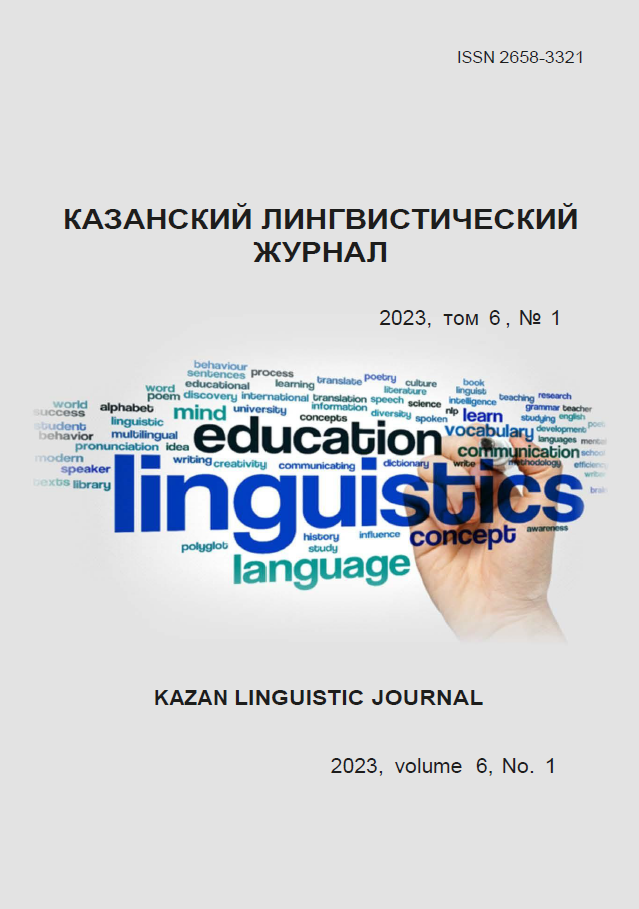Interaction of teachers and students in the digital educational environment in the process of teaching a professional foreign language
https://doi.org/10.26907/2658-3321.2023.6.1.7-15
Keywords:
pedagogical interaction, higher education, professional foreign language, igital educational environmentAbstract
The process of digitalization of higher professional education actualizes the need for theoretical understanding and justification of the established and sustainable pedagogical phenomenon of interaction between participants in the educational process in the new conditions. The State standard of higher education requires a modern graduate to have a high level of competence in foreign language communication. Therefore, improving the quality and efficiency of the educational process is currently an important part of the educational process at the university. Pedagogical interaction, as a structural component of the educational system, which allows increasing the level of students` knowledge of a foreign language, is becoming an object of growing scientific interest. The purpose of the article is to reveal the level of students` motivation for the interaction with teachers in foreign language lessons at the university, considering work in a digital educational environment. Methods of studying, generalizing, analyzing pedagogical literature and pedagogical experience were used in the study as well as the method of questionnaire survey. As a result of the study, empirical data on the students` motivation to interact with teachers in the digital educational environment of the university were obtained; the concept, the essence, the structure and specifics of the interaction between teachers and students in the process of teaching a foreign language were clarified. The materials of the article can be useful for undergraduates, graduate students, researchers in the field of pedagogy.
References
References
Andrienko A. V. Interaction of teachers and students in the context of professional peda-gogy. The world of science, culture, education. 2008; 2(9): 107–111. (In Russ.).
Barabanova Z.P. Organization of educational interaction between the teacher and stu-dents. Modern science-intensive technologies. 2008; 1:40–42. (In Russ.).
Nikolaeva L.V., Savvinova R.V. Interaction between a teacher and a student as a condi-tion for the effectiveness of the professional training of future specialists. Modern science-intensive technologies. 2015; 12(2): 351–354. (In Russ.).
Rubleva Yu.Yu. The essence of pedagogical interaction as a factor in the development of all participants in the educational process. Internet journal “World of Science”. 2016; 4(3): 16–19. Available from: http://mir-nauki.com/PDF/43PDMN316.pdf [accessed: 21.01.23]. (In Russ.).
Che Ahmad, Che Nidzam, Shaharim Saidatul Ainoor, Abdullah, Mohd. Teacher-student interactions, learning commitment, learning environment and their relationship with student learning comfort. Journal of Turkish Science Education. 2017; 14: 57–72. DOI: 10.12973/tused.10190a. Available from: https://www.researchgate.net/publication/317029230_Teacher-stu-dent_interactions_learning_commitment_learning_environment_and_their_relationship_with_student_learning_comfort/link/592fcf6b45851553b67ed652/download. [accessed: 01.19.23].
Moirano R., Sánchez M.A., Štěpánek L. Creative interdisciplinary collaboration: A sys-tematic literature review. Thinking Skills and Creativity. 2020; 35: 1–14. https://doi.org/10.1016/j.tsc.2019.100626. Available from: https://www.sciencedirect.com/science/article/pii/S1871187119302196.
Lapin V.G. Digital educational environment as a condition for ensuring the quality of stu-dent training in secondary vocational education. Innovative development of vocational education. 2019; 1(21): 55–59. (In Russ.).
Monspan T.S. Formation of professionally important qualities of future teachers for work in a digital educational environment: dis. ... cand. ped. sciences: 13.00.08. Irkutsk; 2020. 183 p. (In Russ.).
Petrov P.K. Theoretical and methodological foundations for the training of specialists in physical culture and sports using modern information and communication technologies: monograph. M.; Izhevsk: Publishing House “Udmurt University”; 2003. 473p. (In Russ.).
Ananyin M.S., Nikolaev I.V. Pedagogical interaction as a condition for the effectiveness of educational activities in the field of physical culture and sports. Theory and methodology of physical culture, sports and tourism. Interuniversity scientific method. works. St. Petersburg; 2021: 238–241. (In Russ.).
Korotaeva E.V. Fundamentals of interaction pedagogy: theory and practice: monograph. Yekaterinburg: Publ. House “USPU”; 2013. 203p. (In Russ.).
Frolova G.M. Accounting for the possibilities of pedagogical interaction when planning training sessions. Bulletin of the Moscow State Linguistic University. Education and pedagogical sciences. 2022; 3(844): 94–99. DOI: 10.52070/2500-3488_2022_3_844_94(In Russ.).






